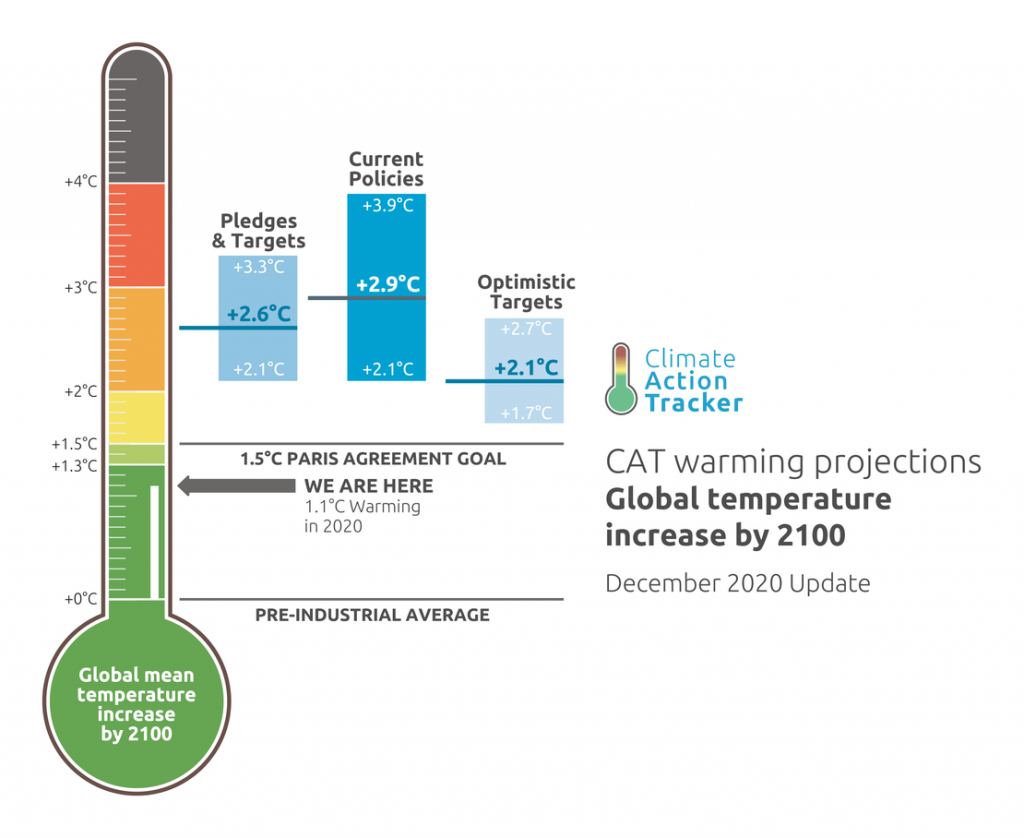A new analysis highlights the dangerous seduction of long-term targets
Originally posted at Legal Planet.
A new briefing (and PDF) from Climate Action Tracker opens with, “The recent wave of net zero targets has put the Paris Agreement’s 1.5°C within striking distance.” Big, if true. But is it?
In the 2015 Paris Agreement on climate change, countries agreed to keep global warming within 2°C and to “pursu[e] efforts” to keep it within 1.5°C. It was already widely known that the latter, more ambitious goal was close to impossible. After all, the 2014 Assessment Report of the Intergovernmental Panel on Climate Change (IPCC) concluded that even the 2°C goal would require not only unprecedented reductions in global greenhouse emissions but also carbon dioxide removal at enormous—perhaps unfeasible—scales. And annual emissions have increased since then.
The briefing continues: “global warming by 2100 could be as low as 2.1°C as a result of all the net zero pledges announced,” offering a range of likely warming between 1.7°C and 2.7°C if these “optimistic targets” are enacted and met. So the 1.5°C still seems decidedly out of reach, despite the opening line.

This forecast assumes that all of the “127 countries [that] are considering or have adopted net zero targets” plus the US (given President-elect Joe Biden’s proposal of net zero emissions) would actually enact and meet these long-term targets. However, most of the net zero targets remain under discussion, whereas only a couple have been set in law (see map). It seems unlikely that all or even most of them will enact—much less meet—net zero targets for 2050.

How much credence should we place in such long-term targets, adopted and otherwise? I have two reasons for giving them little emphasis. First, these targets are for timescales beyond current politicians’ careers (and many of their lifetimes). Given that most heads of state are in office for less than a decade, they have plenty of incentive to make pledges for which they will not have the enact the costly policies necessary to reach the target. Instead, they will pass the burden on to the next cohort of leaders who, if unable to achieve the targets, can accurately respond that they did not make the pledges in the first place.
Second, targets of net zero in 2050 are very ambitious. Let’s take the European Union as an example. Using 1990—the year of the first IPCC Assessment Report—as a baseline, EU greenhouse gas emissions have declined on average 0.9% annually (up to 2018, the last reported year). In order for these emissions to be less than 5% of their 1990 level (logarithmic decay never reaches zero), the average annual decline would need to be 9%. Why would reductions be ten times as rapid in the next thirty years as they were in the last thirty? What’s more, the EU is the relatively optimistic case, as most countries’ emissions have increased since 1990.
What about the shorter term? Most countries’ nonbinding pledges under the Paris Agreement are for 2030. If they actually meet these pledges, then Climate Action Tracker forecasts 2.6°C warming (and perhaps up to 3.3°C). And countries’ existing policies put the world on track for 2.9°C warming (and perhaps up to 3.9°C). It thus seems more accurate to report that we are heading toward 3°C warming and should prepare for 4°C. The good news is that this estimate of warming based on actual implemented policies has, since 2015, declined 0.7°C from 3.6°C.
This is why I consider long-term targets to be a potentially dangerous distraction. They enable political leaders to appear as if they are making progress while avoiding the difficult and politically unpopular requisite steps to actually reducing emissions. It is easy for me to say that I will lose 10 kilograms within a year (and even then I could be held to account), yet what matters much more are my diet and exercise this week. (Long-term targets are sort of the mirror image of catastrophic deadlines.) In the case of climate change, the consequences aren’t just that we must cut greenhouse has emissions more, it is that we must increase other responses: adaptation, carbon dioxide removal, and research of solar geoengineering.
I might be too cynical here. If things go well, then I will live to see whether these countries indeed reach net zero emissions in 2050. I hope that they do. But if I were to bet now, I would choose pessimistic a one.
